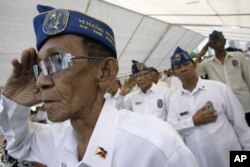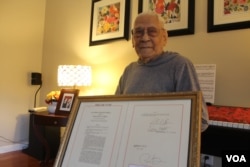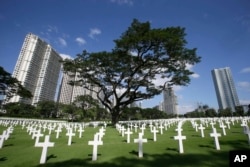Gerardo Tan's home in Stevensville, Maryland, is simple but sits right along the Chesapeake Bay. As a 90-year-old man who has survived war, he's grateful for the tranquil life he now has. But he has one goal left to accomplish.
He is still waiting for compensation that was promised to him for serving as a Filipino soldier during World War II when the Philippines was a U.S. territory. His service earned him three medals, but his battle to get recognition — and payment — from the U.S. Department of Veterans Affairs is still going on.
"I am really angry at the VA," he said, "but there is nothing I can do about it except wait and wait and wait."
Tan and other Filipino veterans are entitled to compensation thanks to a law then-President Barack Obama signed in 2009 that awards $15,000 to veterans like him who are in the U.S. Those in the Philippines are supposed to get $9,000.
That law restored pay and benefits that were taken away from them after wartime President Harry S. Truman signed what is known as the Rescission Act of 1946.
That act stripped recognition from Filipino veterans like Tan, who were suddenly considered outsiders when the U.S. recognized the Philippines' independence.
Obama's reversal in 2009 provided some relief, but that chapter of history still haunts the 17,000 surviving Filipino veterans like Tan.
"Money is not really the point," he said. "It is the treatment."
Another veteran, Celestino Almeda, 100, has a similar story.
He was unaware of the Rescission Act until he became a U.S. citizen in 1996.
"When I arrived," he said, "we found out that the only benefit we had from the government is the Supplemental Security Income," which is a federal income supplement funded by general tax revenue and designed for aged, blind and disabled people with little or no other income. "We cannot even go to the veterans hospital."
Bureaucracy makes it difficult for veterans to get compensated.
A Veterans Affairs official told VOA the agency recognizes the difficulty of finding decades-old documents, but said eligiblity could be established only by military and government records.
In Tan's case, he fought as a guerrilla and has no discharge papers, which makes it hard for him to be recognized.
But there are congressional efforts to fully restore all of the benefits for the veterans. In February, Senators Brian Schatz of Hawaii, a Democrat, and Lisa Murkowski of Alaska, a Republican, introduced the Filipino Veterans Fairness Act of 2018, which would allow veterans and their spouses and children to qualify for some of the same benefits other veterans normally get.
Murkowski said she would keep up the fight on Capitol Hill. "We are going to give it one more go this year, and hopefully these honored veterans will get the benefits and the respect they have clearly earned," she said.
So, more than seven decades after the war ended, this battle goes on.











